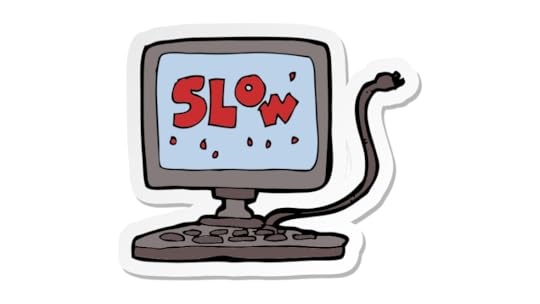Avoiding Sales Management Pitfalls That Slow Down Orders

 Why S-L-O-W sales processes are primary cause of missing quota.
Why S-L-O-W sales processes are primary cause of missing quota.
 Three steps to change: (a) make a change, (b) create a metric, and (c) be accountable
Three steps to change: (a) make a change, (b) create a metric, and (c) be accountable
 If you’re a sales manager, your first responsibility and highest priority is day-to-day coaching of your salespeople.
If you’re a sales manager, your first responsibility and highest priority is day-to-day coaching of your salespeople.
 Avoid these 5 common missteps of sales managers.
Avoid these 5 common missteps of sales managers.
Why Are You So S-L-O-W?
Why are your sales so slow? I’m not
referring to your order rate. I am talking about the activities and processes
that have to be happening in Zero-Time in order for you to achieve your sales
goals. One thing leads to another and if you are running in place in February,
you’ll be running to catch up by March and hopelessly behind by June.
Here we are, still near the
beginning of a new year, when hopes for the next twelve months should be
running high. And your selling efforts feel like they are stuck in the thick
mud. Just like they were last year. This is not the way to kick off what should
be your most successful sales year ever.
Everyone has a reason or an excuse
for slow selling. Believe me, we have all been in a situation where you
question your sales manager about why it is taking so long to move a customer
along in their buying cycle, and they don’t have an answer that makes sense. Or
any answer at all.
I ask all my new clients to
identify the reason, or reasons, why they are not growing, why their sales
efforts are stuck in neutral. The responses I receive are typically all of a
piece. As CEOs they can identify the symptoms but not the causes of the
problem. But as CEOs and sales managers of SMBs you can’t be a doctor who can
only diagnose the symptoms of the illness without prescribing a cure.
I group the symptoms of sales
lethargy into the S-L-O-W acronym.
S is for Status Quo.
Too many companies are just
coasting along. The CEOs are not really satisfied with their results but they
are too worried about making any changes that could rock the boat and
potentially jeopardize the sales they do manage to capture. Maintaining the
status quo is not a way to thrive.
“Status
Quo is ancient Greek for ‘slow death.'”
Folks, say hi to Milt again. (To
learn more about Milt, check out my book, Zero-Time Selling,
or this previous blog post. )
“Hey.”
Actually, Milt, Status Quo is not
Greek. It is Latin for “the current state of affairs.” But when an
SMB’s sales are stuck, maintaining the status quo is the same as slowly dying.
“As
I said.”
L is for Lack of Urgency.
In today’s economy you can’t expect
the customer to operate on your schedule. The timeframe for every sales action
has to be immediate. Customers do a lot of online research on your product
before they ever call you and when they do they are single-mindedly looking for
answers to their questions. The first seller with the complete answers wins.
O is for Outdated sales practices.
Unfortunately, many SMBs still
operate their sales teams like it is 1912 not 2012. Their only concessions to
the 21st century are a website and email.
“What
would you call my pager?”
Google d-i-n-o-s-a-u-r.
Your customer and their buying
behavior have been irrevocably altered by technology over the past 15-20 years.
And if your sales practices and sales methods haven’t changed in concert with
your customer then you can’t expect to effectively compete for their business
against competitors who have evolved.
“Google
N-E-A-N-D-E-R-T-H-A-L?”
W is for Weak sales management.
I don’t like to point fingers.
“But
you will.”
SLOW starts at the top.
Even a highly self-motivated sales
person will find it hard to succeed in company where the status quo rules,
where everyone’s motor revs at a slower idle and where the sales systems and
processes were obsolete before the turn of the century. A successful sales
culture begins and ends with management. The CEO and sales management have to
commit to change and urgency.
3 Steps To Change

Now, as you move further from the old sales year and deeper into the new sales year, now is the time to evaluate what you can do to shake things up, to change the routines your sales team have followed year after year. Break some of your bad old habits and reach a level of sales success that you haven’t achieved before.
Here are THREE tips you can put to use today. These are not permanent fixes. Or suggestions for how to comprehensively revamp your sales efforts. There are just small ideas you can put to use TODAY that can begin to make a difference and break you out of the SLOW mold. It doesn’t matter which one you choose. Just choose one of the following steps and put it into play.
Make One Change Today.
Take a close look at your sales
routines; your sales processes. Tell each of your salespeople to choose just
one customer facing activity and change it. Now. Don’t just pay lip service to
change. Do something about it. This is not a change that requires a committee
to plan and implement. I’m advocating something much more simple than that.
Just choose one aspect of your day-to-day sales activity and change it. Simple.
Create a Metric.
Every aspect of your sales process
is measurable. Do you have metrics for each step of your selling process? Are
you measuring how long it takes to respond to your sales leads? Or how long it
takes you to write a quote and deliver it to a prospect or customer? Choose a
single aspect of one sales process and assign a metric to it. Then measure it
today and again tomorrow.
Be Accountable.
Tell someone about the change you made or the metric you’re tracking. Tell a colleague that you have undertaken to make a change in your sales routine. Tell your boss which part of your sales process you have begun to measure and what the goal is. When you tell someone else that you are making a change they will be interested to learn if it is helping you. As a result they will ask you how it is going. And you will need to have an answer for them. Being accountable for change is a big motivator.
If You’re Not Coaching, What Are You Doing?

What’s Your #1 Priority?
If you’re a sales manager and your
number one priority each and every day is something other than coaching the
individuals on your sales team to improve their sales productivity then what
are you doing? Whatever it is, put it on hold and take care of your priorities.
The term coaching is in vogue these
days. Much has been written about the importance of sales managers becoming
coaches for their team. Studies have been cited that claim that it is the
single most important thing you can do. A commonly cited statistic is that a
19% improvement in sales productivity is to be expected with effective
coaching. To which my response is an old-fashioned “Duh.”
The fact is that coaching is
nothing more than disciplined sales management. There is no distinction between
the two. I attended a conference recently where consultants talked about how
they were hired to coach front line sales reps in companies with sales managers
in place. The claim was that sales managers had too many other responsibilities
and no time to coach their direct reports. I don’t buy it.
If you’re a CEO, there should only
be two reasons why a 3rd party consultant should be providing coaching to your
frontline sales team:
Your sales managers are inexperienced and don’t know how to effectively coach. That is okay. New sales managers need to be trained. They don’t arrive in their first sales management assignment fully formed and ready to effectively function as a manager any more than newborn babies are born ready to memorize and recite Shakespeare. But, if this is the case, then train your sales managers. If can’t do it yourself, then hire that consultant to coach your manager, but never your sales team. Teach your managers how to be effective sales coaches. And, if they are unable to do that then…
Your sales managers are in the wrong job. You need to find someone new who is capable of performing the hard work that comes with being an effective sales manager.
What should a sales manager do to be an effective coach?
A. Make certain that each member of your team fully understands the playbook.
In this instance the playbook means
the sales team is thoroughly trained to know the answers to the
“what” and “how” questions. What are they selling and how
are they selling it? Sales reps need training in the sales processes you use as
much as in the products you sell.
B. Work with each member of your the team to develop an individualized sales plan.
The sales plan is simply composed
of the objectives, strategies and tactics that the individual sales rep is
going to employ to achieve their assigned goals. People gravitate towards sales
as a career because it gives them a sense of being in control of their own
destiny. But they aren’t going to find their destiny without a road map. The
effective coach makes sure their reps understand what each day, week and month
holds in store.
C.
Set expectations not only by your words, but also by your actions.
This is not about achieving the
number but about the process and what it takes to mold someone into a high-functioning,
self-sufficient salesperson. Sales is a craft. Learning how to successfully do
it is an apprenticeship. The most successful salespeople I know learned their
trade by watching their managers at work and integrating the skills and
techniques they observed into their own daily selling routines. An effective
coach has to be able to demonstrate the skills they are teaching.
D.
Get down into the nitty-gritty.
This means conducting regular
detailed reviews of every deal your reps are working, supplying the strategic
and tactical coaching to move deals along, as well as providing the wisdom,
guidance and counsel a rep needs to motivate them to persevere when the going
gets tough. It means understanding the details of your teams’ deal so you can
provide day-to-day guidance to ensure that opportunities are continuing to move
forward.
E.
Develop a strong level of trust with your team members.
How does that trust get
established? By being openly invested in each rep’s success to the same degree
that they are. This is a tough standard for sales managers to meet. But the
great sales managers are all able to make it happen. Read interviews with
players from great sports teams that have won championships and the common
attribute they cite for their success is the high-level of trust that the
teammates had in each other. In short, they had each other’s back. Have your
team’s back.
My first sales manager was Ray. Ray
was the most no-nonsense manager I have ever encountered. (My hiring interview
with Ray lasted 2 minutes and he said all of 12 words. But that is a story for
another day.) It was primarily through his coaching that how I first learned
how to sell (and be a sales manager.) Everyday we sat down and reviewed each of
the deals I was working on. He taught me how important it was to not waste a
minute, hour or a day if I was stuck on a deal and needed advice to see what I
needed to do next. I remember coming into the office one morning when I was in
the midst of a month-long sales slump and Ray was standing by his desk with his
jacket on and car keys to his big red Oldsmobile jangling in his hand.
“C’mon,” he said. Let’s go make some calls.” We’d spend the
morning talking to prospects. Sometimes I’d take the lead and sometimes Ray
would take the lead. But I would always come back from those calls smarter
about selling and motivated to knock it out of the park.
Being an effective coach means nurturing the success of the people who work for you. At the end of the day, that is the highest success a sales manager can achieve. If you’re a sales manager, and you’re not coaching, what the heck are you doing?
5 Common Missteps of Sales Managers

A sales manager at the helm of a sales team has the
responsibility not only to manage the definition and implementation of
effective sales processes but must also provide the leadership and coaching his
or her sales team requires to effectively utilize the sales processes to
achieve and exceed their goals. This blend of strategic and tactical skills is
not easy to achieve. Sales Managers often are more comfortable with one aspect
of their sales process leaving them to neglect others. That is human nature.
Being aware of the five classic pitfalls nearly all sales
managers experience at one time or another will help you avoid unnecessary
setbacks and smooth your path to sales growth.
1. Protecting the Status Quo
As important as a sales process is, a slavish adherence to the
status quo is the first step on the road to failure. Generally, as a sales team
is developing, a great deal of attention is focused on creating the structure
for sales activity and sales growth. Managers make the mistake of assuming that
once their sales process is in place that they can solely focus their efforts
on tactical sales management. The problem is that elements of your sales
process may not be a perfect match for your target market or for the
individuals you have on your sales team. As a sales manager you must pay
constant attention to your sales process to ensure that it is always supporting
and not impeding, your sales efforts and take immediate steps to revitalize it
when it has become outdated or stale.
2. Losing the Urgency
A second pitfall sales managers have to confront is losing their
sense of urgency. This is not to say they become complacent. Rather they don’t
act and manage with the requisite responsiveness. Prospects and customers have
questions and want answers in Zero-Time in order to make informed purchase
decisions in the shortest time possible. Neglecting to reinforce this urgency
within your sales process and your sales team will inevitably lead to a
decrease in responsiveness and, ultimately, orders. In sales, everything is
urgent or needs to be. As a sales manager, if you aren’t maintaining this
attitude of immediacy in all that you do, you risk failure.
3. Failing to Measure
Neglecting to establish metrics for key processes and
overlooking the necessity of regularly measuring how the processes are
performing is a common oversight that negatively affects sales productivity. A
sales process is not an abstract concept but a discrete set of required steps
to achieve a certain goal within a certain period of time. As a sales manager
you must continuously measure the outcomes of your core sales processes and
take the necessary steps to refine them and make them even more productive.
4. Providing Incomplete Training
Sales managers often fall into the habit of providing limited
training for their sales team. They focus on isolated skills and product
training to the exclusion of integrated sales training that teaches how to
deploy their skills and knowledge within their sales processes to win customer
orders. Sales people have to be trained on their processes as deeply as on
their sales skills and product knowledge. Ignoring this training is akin to
putting 11 football players on the playing field and telling them to just
improvise plays and do whatever they please.
5. Swimming with Minnows
Too many sales managers keep chronically underperforming sales
people onboard well past their expiration date. You don’t want to keep swimming
with minnows when you need to be cruising with orcas to make your numbers. If
you have salespeople who aren’t suited to sell your product or service then
every minute you keep them is a minute too long. It is a myth that good
salespeople can sell anything. To ensure the growth of your company,
salespeople must have experience and skills that will enable them to be
completely responsive to the information requirements of their prospects in
Zero-Time. If they don’t, they must go. Period.
It has never been easy to be a sales manager. However, if you
can avoid these common missteps then you, your team, and your company will all
benefit.
The post Avoiding Sales Management Pitfalls That Slow Down Orders appeared first on Andy Paul.
Andy Paul's Blog
- Andy Paul's profile
- 4 followers



